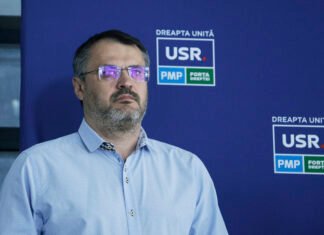George Simion Addresses Request to Remove Mihail Neamțu from Culture Committee
Recent, George Simion responded to calls for the removal of Mihail Neamțu from his position as head of the Culture Committee. This request follows Neamțu’s controversial remarks directed at Oana Țoiu, which many have deemed disrespectful and out of line.
Simion’s defense of Neamțu came amid rising tensions in the political arena. In his statement, he mentioned that critics had failed to address the real issues at hand and accused them of being both “poorer” and “less intelligent.” His remarks reflect an ongoing rivalry among various political factions and emphasize a culture of combative dialogue rather than constructive criticism.
Neamțu’s comments about Oana Țoiu, which sparked the backlash, are perceived by many as indicative of broader societal issues where public figures sometimes resort to personal attacks, undermining the dignity of political discourse. The nature of Neamțu’s remarks raised questions about respect and professionalism in politics.
In the context of Romanian politics, where cultural values and societal norms often clash, Simion’s response serves to highlight the divisions among different political entities. On one side are those who prioritize civility and respect in public discussions, while on the other are individuals who engage in sensationalism and disparagement. This divide complicates efforts to create a unified political landscape where representatives aim to work collaboratively for the welfare of the public.
Moreover, the call for Neamțu’s removal reflects a growing demand for accountability among elected officials. As social media continues to amplify public reactions, politicians find themselves more exposed to scrutiny. Consequently, they must navigate a complex landscape of public opinion where mistakes can quickly lead to significant political fallout.
Simion’s remark, describing his critics as “săraci” (poor) and “proști” (stupid), suggests a defensive posture aimed at diminishing the concerns raised by those calling for changes within the committee. By framing the criticism in such a way, he seeks to undermine the legitimacy of the call for Neamțu’s ouster.
As the situation unfolds, it raises questions about the responsibilities of leaders to create an environment conducive to respectful dialogue. Addressing the cultural landscape from which such remarks arise may be crucial for the advancement of political conversations in Romania.
Public figures wield a significant influence over societal norms, and their language can either uplift or degrade discourse. Thus, the challenge lies in fostering a political culture that encourages thoughtful discussion rather than name-calling or derogatory remarks. This aligns with the wider societal goal of promoting a more respectful and inclusive atmosphere, not just in politics but in all spheres of public life.
In conclusion, the controversy surrounding Mihail Neamțu’s leadership in the Culture Committee, triggered by his remarks towards Oana Țoiu, exemplifies the pressing need for respectful communication in politics. George Simion’s response illustrates the stark divisions that exist in Romanian political discourse today, highlighting the ongoing challenges in bridging these gaps for a more constructive political environment going forward.






